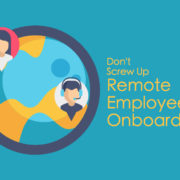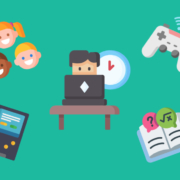Healthy Working From Home: Part 2
If you work from home, your friends have likely told you how lucky you are, or how they wish they could work at home too. Their minds immediately go to the benefits of working from home. They overlook the challenges of working remotely.
In the first part of this blog series, I wrote how remote workers can maintain good physical health by making a plan to avoid bad, unhealthy habits. However, in order to stick to any plan, a person needs to be mentally strong and disciplined. And as with your physical health, there are certain bad habits to avoid in order to maintain mental fitness.
Please Note: the following advice does not attempt to resolve, minimize, or otherwise simplify the seriousness and complexity of mental health disorders.
Bad Habits That Affect Your Mental Fitness
You’re Not Sleeping Well
This bad habit could very easily be discussed with physical health because it is foundational to your overall health. However, poor sleep can often be the first domino that falls in a series of bad habits that affect your mental fitness. Not getting enough quality sleep negatively impacts your judgement, mood, and memory. Poor performance in these areas can lead to further negative outcomes–physical health being one of them.
So any discussion of improving your mental fitness while working at home must begin with establishing a prerequisite for good sleep. The National Sleep Foundation quantifies that as 7 to 9 hours per night for most adults. Seems easy enough, but why is this a challenge for remote workers?
The late weeknight has many temptations: television, page-turning books, social media…a few drinks with friends. These are possible temptations for all workers, but there are little justifying thoughts that can pop into the head of a remote worker: “I’m working from home tomorrow. I don’t need to get ready for work. I don’t need to drive to work. I can sleep in a little. I can stay up a bit later.”
Five episodes of Game of Thrones later, you’re finally getting to bed at 1:00 AM. You plan to get 7 hours, but you’ll wake up at 6:45 AM, unable to get back to sleep. So you put the coffee on and start your day.
There’s no getting that sleep back, even with a midday nap. Your day is off to a bad start and you haven’t even started working. This provides the mindset for a host of bad habits to follow–some that are listed below or covered in part one.
Your Solution: Set a bedtime that provides for enough hours of quality sleep. And go to bed on time! To help yourself in this task:
- Move to your bedroom at least 30 minutes before you plan to fall asleep.
- Use that time to read, meditate, sudoku, crossword puzzle, or talk to a loved one, but NO screens (phones, tablets, TV’s, etc.)
- Ensure that you have a completely dark and quiet room–blackout blinds, non-visible alarm clock, and a white noise machine will all help with this.
You’re Not Focusing
It’s hard to focus on a task when you’re tired, but there are other things that can cause you to lose focus as well. Stress–internal stress and external stress–can cause your mind to wander while you’re working anywhere, but at home it can become more prominent.
Internal Stress
When most people hear the word “stress,” they think of internal stress–worry, anxiety, dread. Often times internal stress is the result of outside factors associated with work, interpersonal relationships, or other ongoing responsibilities and commitments. It’s these factors that initiate the stress, but then it continues to exist in your mind.
When working from home, internal stress can often be exacerbated. Work stress is higher when communication with coworkers is weak or inefficient. Interpersonal relationships may be strained if family members fail to respect your home/work boundaries. And then there is the constant temptation to attend to house chores that you’ve been putting off–laundry, vacuuming, lawn care…that DIY project.
External Stress
External stresses are short-lived and immediate, though they may occur frequently. These are almost always a result of the environment and affect one of your five senses. They may also be a factor that contributes to internal stress.
If you’ve ever been dutifully working from home, only to be interrupted by the sound of your neighbor cutting grass, then you’ve been affected by external stress. That interruption might, in turn, remind you of the need to cut your own grass (internal stress), which you can’t do tonight because your child has a soccer game (more internal stress)…suddenly you’ve lost focus!
Your Solution: As best you can, make an effort to control your work environment and structure your schedule. One of the great benefits of working remotely is the ability to enjoy the coziness of your home. However, this should not be confused with working anywhere within your home at anytime. Set boundaries with the following tips:
- Print out your work schedule and share it with your family members and overly neighborly neighbors. Let them know that you cannot be distracted when working.
- Create a quiet, clean space with a quality desk and chair, free from distractions, to help you maintain focus on your work and keep external stresses at bay.
- Lean on the side of over-communicating via email with co-workers. For particularly complex or important discussions that must take place while you are at home, call or use video chat.
- Structure your free time wisely. Sometimes working at home makes you feel like you’re always on the clock. It can be difficult to transition from working for your employer to working for yourself, but by using your free time wisely to take care of household chores and personal commitments, you can lower internal stress while working from home.
You’re Not Engaging With Coworkers
Good communication with coworkers is important for productivity and to reduce stress when working from home, but it also serves another purpose when working at an office. Communication helps coworkers engage with one another through the sharing of experiences. This sharing can easily be threatened when a team is working from home.
We all know about the dangers of working from your email, or allowing email to manage your work schedule. Because of this, recipients often prioritize the emails they receive, and senders streamline the emails they send (no one wants to be the annoying emailer). Although these strategies help keep the focus on work, they also reduce the opportunities to share.
When working from home, there is no water cooler or break room for small talk. You really have to go out of your way to engage with coworkers, and it may seem forced or unnatural. The physical space between you and your co-workers may even make you feel that engaging in small talk while “on the clock” is somehow wrong.
Your Solution: Team bonding is difficult for remote workers, especially if they are working from home full-time. To a large degree, a team’s ability to overcome this really depends on their personalities. But organizations can facilitate bonding by creating a structure that provides opportunities for sharing. A few ideas for this include:
- Schedule at least one day per week when the entire staff works from the office.
- When a physical office is not available, have a weekly department meetup for remote workers at a coffee shop, co-working space, or library. Or have a team member host at their house!
- Require staff to share a short, weekly “non-business” update with the team on Mondays. This could be a weekly “How was your weekend?” email chain.
- Conduct remote meetings via skype or another video enabled chat service. Seeing each other’s faces may make you feel closer.
- Host monthly, low-cost gatherings that are “non-work” such as a happy hour, miniature golf, or bowling.
You’re Not Motivating Yourself
Finally, your mental fitness can really be at risk when you fail to motivate yourself through work. No one wants to work in an office with a manager constantly looking over their shoulder, suffocating them. But the opposite scenario can be equally challenging.
Working from home by yourself can be, at once, both empowering and isolating. This is especially the case when communication or engagement is low or poor. Even for those who are intrinsically motivated, it can take some time to adjust to working remotely. Thankfully, there is no shortage of resources on self-motivation! But first, you have to recognize that your motivation may be lacking.
Your Solution: Take inventory of your current level of motivation.
- Do you feel that you are accomplishing something meaningful everyday?
- Are you staying “on task” on a consistent basis?
- Are you contributing new ideas to the organization?
- Do you feel that you have grown as a professional over the last 3 months?
The full answers to these questions can tell you a lot…more than just whether or not you are motivated. But what’s most important to know is that you are in control of these answers.
Answering “yes” to these questions will not always be easy. It requires self-motivation, goal setting, and discipline. And answering “no” to these questions cannot be automatically blamed on your employer. An organization can create a structure for you to succeed, but it’s ultimately up to you to get to “yes”–especially when you’re working from home.
Working From Home | Plan Healthy Habits
Sleep, focus, engaging with coworkers, and self-motivation are four key areas of mental fitness that are vital to maintain when working from home. Building strong, healthy habits in these areas can be challenging, especially for those who are transitioning to remote work.
A good strategy is to structure your workday as if you were, in fact, in the office. Arrive and leave at the same time everyday, and schedule breaks consistently. Do everything you can to simulate an office environment in a designated area of your house, and let your family and friends know your schedule–and its importance. To stay motivated, you can write reminder notes of your goals and post them in your workspace.
As you become accustomed to working at home, you can begin to make small adjustments to your schedule, like working on the patio for an hour or taking a trip to the gym over lunch break. This will make it easier to adjust to changes and allow you to enjoy the full benefits of working from home.
ExactHire provides paperless hiring software that makes it easier for teams to complete their work from anywhere. Our applicant tracking software and employee onboarding software provide HR teams with the tools they need to communicate and manage hiring processes effectively.









